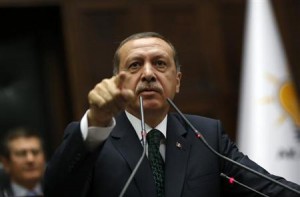 The political crisis shaking Turkey spilled over into the country’s ties with the rest of the world on Saturday, as Recep Tayyip Erdogan blamed outside forces for the country’s worst corruption scandal for years and appeared to threaten the US ambassador.
The political crisis shaking Turkey spilled over into the country’s ties with the rest of the world on Saturday, as Recep Tayyip Erdogan blamed outside forces for the country’s worst corruption scandal for years and appeared to threaten the US ambassador.
Speaking at a rally at the Black Sea town of Samsun, the prime minister attributed the investigation into the scandal – which involves allegations of millions of dollars of bribes, smuggling, the fixing of tenders and illegal construction – to a plot “with international dimensions” against his government.
Sixteen people were formally taken into pre-trial detention on Saturday – including the sons of the country’s interior and economy ministers and the chief executive of Halkbank, a state-owned bank – while others were released from police custody pending trial.
On a day when several pro-government papers prominently accused Francis Ricciardone, US Ambassador to Turkey, of involvement in the corruption probe, Mr Erdogan warned “foreign ambassadors” against meddling.
“Very strangely, ambassadors have become involved in some provocative acts in recent days,” Mr Erdogan said. “I am calling on them here: do your job . . . We do not have to keep you in our country.”
“The US is in no way involved in the ongoing corruption and bribery operation,” the US Embassy said. “Nobody should put Turkey-US relations in danger with unfounded claims.”
Turkey’s relations with the US hit a peak in 2009, when President Barack Obama praised the “model partnership” between the two countries.
But ties have become tense with differences over Egypt, where Mr Erdogan called for the West to denounce the coup against former President Mohamed Morsi, Syria, where the Turkish prime minister wanted a Kosovo-style campaign against President Bashar al-Assad and Washington’s concerns about the Turkish government’s crackdown on mass protests.
Mr Erdogan has sought to rally his base as he faces some of the biggest political challenges of his rule ahead of important elections next year including a contest for control of Istanbul and the country’s first direct vote for president.
“I presume this will work with Erdogan’s core constituency,” said Steven Cook of the Council on Foreign Relations of the prime minister’s latest remarks. “There’s a reservoir of anti Americanism in Turkey and this is going back to the well.” He added, however, that despite frustration with Mr Erdogan Washington still sought co-operation with Turkey because of the country’s strategic importance.
“The US doesn’t want to be the story; it believes it can work with Turkey on a variety of issues and we are essentially going to turn the other cheek when Erdogan turns up the heat.”
The prime minister’s depiction of the corruption investigation, which has seen more than 50 people detained, as a conspiracy against his government, echoes his rhetoric over this summer’s mass protests over his rule, initially sparked by concerns over the fate of Istanbul’s Gezi Park. “We will give this dirty game away as we did during Gezi,” he said on Saturday.
However, many of Mr Erdogan’s supporters, and a large number of outside observers, link the investigation specifically to the movement of Fethullah Gulen, an Islamic cleric whose followers are widely thought to have extensive influence within the Turkish police and prosecutors service.
In a sign of the intensification of the crisis, Mr Gulen issued his most bitter attack on the government on Friday night, cursing those who were seeking to halt the probe.
“Those who don’t see the thief but go after those trying to catch the thief, who don’t see the murder but try to defame others by accusing innocent people – let God bring fire to their houses, ruin their homes,” Mr Gulen said in a video released on the internet.
Mr Gulen’s lawyer has denied that the 72-year old has any connection with the investigation, as have members of the Gulenist movement. But Mr Gulen said there was an effort to “finish off” his movement – Mr Erdogan has removed or reassigned dozens of police, including national police chiefs and the Istanbul police chief. “The issue is about the public’s rights,” Mr Gulen added. “If public property is being robbed, you cannot somehow soften this, by either regulations or demagogy and dialectics.”
According to widespread reports in the Turkish media, police have found $4.5m in a shoebox belonging to of one of the targets of the investigation – Mr Aslan, the Halkbank chief executive.
Photos purportedly from the investigation have also been leaked to the Turkish press showing what appear to be very large cash transactions, and in the case of Baris Guler, the son of the interior minister, large piles of cash in his house.
Halkbank has not responded to Financial Times requests for comment. But Egemen Bagis, Turkey’s EU minister, one of four ministers reportedly targeted by the investigation, denounced in a written statement what he said was “irresponsible reporting . . . completely based on misleading and speculative information.” He said claims against him were “part of an outrageous conspiracy.” Mr Bagis, like the other ministers, has parliamentary immunity.
Financial Times

Leave a Reply
You must be logged in to post a comment.